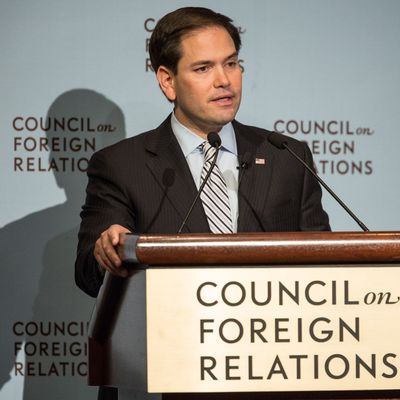
While Jeb Bush was tripping over his own comments about whether he would have invaded Iraq this week, Marco Rubio was trying to convey a more polished front. In a major foreign-policy speech at the Council on Foreign Relations Wednesday, Rubio outlined his foreign-policy doctrine. He called for more “moral clarity” when it comes to American foreign policy, more funding for the military, and highlighted his opposition to President Obama on the Iranian nuclear deal and normalization of relations with Cuba.
The speech went far beyond any of the other GOP candidates in articulating a worldview, but it also demonstrated that Rubio, like Bush, has his own tricky balance to strike: between the foreign-policy views he espoused through much of his Senate career, which sometimes aligned him with the president, and the bellicose posture required of someone seeking to be the GOP’s most prominent hawk.
The moment has been a long time in the making: Ever since he was elected in 2010, Rubio has been working to position himself as a leading foreign-policy voice. He landed seats on the Senate Foreign Relations and Intelligence Committees, and once in the Senate, he aligned himself with hawks like John McCain and Lindsey Graham. In 2011, when members of both parties were uniting in opposition to the president’s request for authorization of military force in Libya, he wrote a letter to Harry Reid and Mitch McConnell urging Congress to pass it. The following year, he told a crowd at the Brookings Institution that “we should be open to negotiations” with Iran. He even told attendees of a previous CFR speech that he didn’t “want to come across as a saber-rattling person, because I’m not.”
But getting through the GOP primary without any saber-rattling may prove an impossible task. Foreign policy has become the top concern for Republican voters in some recent polls, and Party strategists are convinced that Obama’s work on the Iranian nuclear deal — which they view as a disaster — can be a great opportunity for the nominee who eventually takes on his former secretary of state. Even in the Senate, the GOP is championing its biggest breast-beaters, lining up behind freshman senator Tom Cotton when he penned a letter warning Iranian leaders that their negotiations with the president on a nuclear deal amounted to “a mere executive agreement” that could be thrown out by the next president.
This weekend, Rubio gave the clearest sign yet that he was shifting to a new style of rhetoric. “On our strategy on global jihadists and terrorists, I refer them to the movie Taken. Have you seen the movie Taken?” he said at the South Carolina Freedom Summit on Saturday. “Liam Neeson, he had a line, and this is what our strategy should be: ‘We will look for you, we will find you, and we will kill you.’” The line was a huge hit.
Channeling Liam Neeson will be essential to distinguishing himself from the guy he’s trying to replace — whom, opponents might point out, he sometimes sounds an awful lot like. Rubio also pointed to the “Cuban dissidents devastated by the president’s concessions to the Castro regime for nothing in return … North Koreans disappointed by America’s reluctance to speak out against modern-day gulags … Arabs and Israelis worried about America’s indifference to Iran’s growing influence.” He added, “In recent years, the ideals that have long formed the backbone of American foreign policy — a passionate defense of human rights, the strong support of democratic principles, and the protection of the sovereignty of our allies — have been replaced by, at best, caution, and at worst, outright willingness to betray those values for the expediency of negotiations with repressive regimes.” It was a speech that no doubt will appeal to a large swath of his party’s voters in next year’s primary — provided he isn’t drowned out by more belligerent voices first.





























